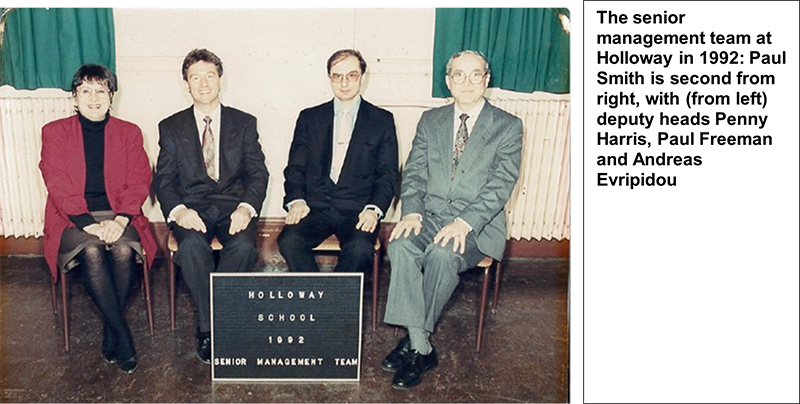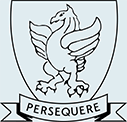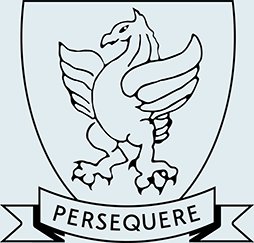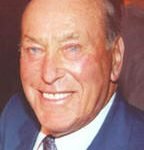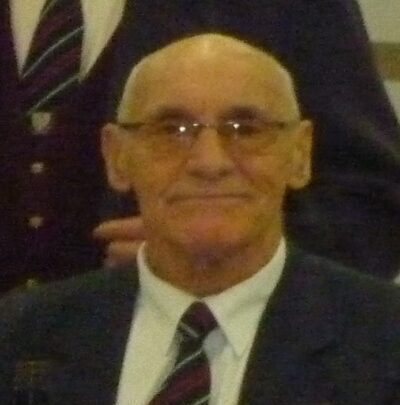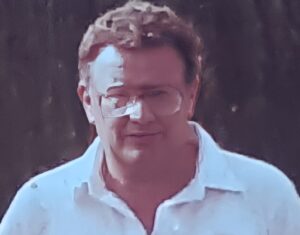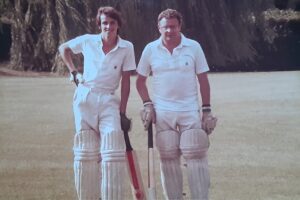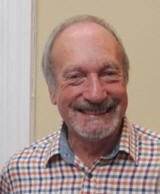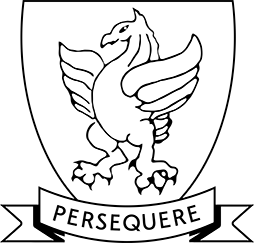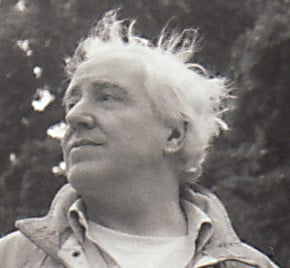
It is with great sadness that we learned of the passing of Larry Noades, a former pupil at Holloway School (1948 -1953). who died on 28th January 2023, aged 85.
David Noades, Larry’s son, has written a tribute to his dad. Explaining that Larry did not want a lot of fuss when he died so we’re having a private cremation and will be doing something to celebrate his life later. If anyone wants to leave a memory and a donation for Macmillan Cancer Support they can do so at the JustGiving page: https://www.justgiving.com/fundraising/david-noades
“My dad, Larry Noades, attended Holloway Grammar School between 1948 and 1953. I know he was in contact with a few of his old pals a few years ago, and they shared memories and a few photographs, and I believe he met up with some of them. He didn’t keep in contact as much as he would have liked as he had a stroke a few years ago which affected his memory but he often spoke with fondness of his time at the school.
Larry was born in Islington, London on 9 June 1937. He grew up in Islington-Camden area with his parents. In January 1941 the flat he lived in near Euston Station was bombed during the Blitz, he and his mum were two of only three survivors (18 others died). He was evacuated to Bedford until 1945 with his mum, his aunt and cousin. Larry played with pals in the streets of Bedford, cycling, playing football, watching cricket. His dad was away on active war service until 1945.
Larry moved back to London, Islington from 1945 to 1953, then Camden again from 1953 living in a modern flat. He attended the Hungerford Primary School and then the Holloway Boys Grammar School from 1948 to 1953. His classmates were Alan Starkey and Peter Girolami, Larry said “they would call for me en route to school and sometimes at weekends we went to the library at Camden Town, and then spent an hour or so nosing about in W H Smith (can you imagine kids spending a whole Saturday morning doing that these days?)”. They also used to attend a youth club near St Paul’s Church in Camden Square. Table tennis and billiards was how they used to pass their time.
Larry left school at age 16 and had no idea what he wanted to do. He was by his own admission somewhat artistic (excelling in art, languages and English at school), so he drifted towards what was then called commercial art. He landed a job as a junior in the publicity department of Thomas Cook, the travel company, located in London’s West End. The pay was poor but the work was interesting working on posters and advertising. Larry said “the idea of going on to college or university after school was not even discussed at home. My Dad didn’t have much of a job, so it was inevitable that I would/should find work asap. I didn’t mind this, as most of my pals were a year or two older than me and had left school at 15, so were already earning”.
The job at Cooks was interrupted by two years National Service from 1955 serving as a radar operator in the RAF, first at Peterhead in Scotland, and later at Ventnor in The Isle of Wight. While in the RAF Larry formed a skiffle band with some mates and played at the Isle of Wight Festival (he had previously formed a group of sorts when he was 17 and played a few concerts including a talent show while on holiday with pals in 1955 in Devon). After National Service he went back to the Cooks job for a year or so. Then his boss, impresed with his progress, bullied him into applying for a job at an advertising agency who were looking for a junior typographer, offering about three times what he was getting at Cooks. He got the job at Coleman, Prentiss and Varley Advertising Agency, and found his niche working as a typographer.
Larry was almost 18 when he met his future wife Shirley via he cousin who was a pal of his. She lived near Hampstead Heath, and later Greenford in Middlesex. Once he left the RAF he visited her as often as he could. They married in 1959, but with such a distance between them – and both working a full week – finding a flat proved very difficult. Eventually they found one in Dalston, through a mutual friend. Shirley was a skilled comptometer operator, and made more money than Larry did for the first year or so. In 1961 their first son Mark was born, the second son David arriving the following year. They moved to a slightly bigger flat in Kingston, Surrey. They bought their first car at that time, a blue Morris Minor – which made a difference to their lifestyle.
Larry left Colman, Pretiss and Varley in 1970, joining Castle Chappell and Partners. Clients included Ferguson-EMI, The Royal Mail and British Leyland. Larry also worked on designing the type on record covers for the rock band Deep Purple (the bands manager worked at the same ad agency). in the 1960s he owned a caravan in Winchelsea, Sussex and the family regularly holidayed there.
In the 1970s annual holidays were usually self-catering in the UK, but also hotel holidays in Ibiza and mainland Spain. Later Larry and Shirley visited Paris, Brussels, Portugal, Switzerland, Egypt, and USA. But in more recent years it was always Winchelsea or Leigh-on-Sea in Essex which he preferred as it bought back memories of family holidays with his parents a boy and the holidays with his wife and sons in the 1960s. Larry and the family moved to Watford, Hertfordshire. He went freelance in 1980 and worked first alone, later in partnership with son David working mainly on holiday brochures and packaging design. Taught himself desktop publishing in 1993 when he was 56. Larry retired in 2010.
His hobbies included collecting vintage model toys, advertising memorabilia, model making, real ale, winemaking, reading, watching old films and TV, writing, for ten years wrote column in Bus Collector magazine about model collecting. He was a lifelong supporter of Arsenal football club and had attended many matches as a boy with his uncle.
In the late 1970s for twenty years Larry worked as a part-time lecturer at the local West Herts. College in Hempstead Road, teaching design for printing, He got on well with the students and was very popular. He often went with them on outings which was a chance to sample the local beer (another of Larry’s hobbies). He was a member of local West Herts Sports & Social Club, partly to watch the cricket but also to enjoy hospitality in the bar, meet and chat with friends. After retiring he enjoyed life driving with friends to antiques fairs and collectors’ fairs, buying and selling vintage toys and collectables. Also attending vintage vehicle rallies with friends.
Larry liked to keep busy. Proud of house which is detached with large garden which he maintained with help from the family. He also loved his cats. After suffering a stroke in 2013 from which he largely recovered he sadly developed vascular dementia in recent years and lived in a care home for the last two years. Just after Christmas 2022 Larry was diagnosed with liver cancer which was inoperable and he passed away in January 2023.
Larry often spoke about his old schools with particular fond memories of his time at Holloway Grammar. If anyone wants to share a memory or wants to leave a message they can on Larry’s page on the JustGiving website where they can also leave a donation (any amount) which will raise funds for Macmillan Nurses.”
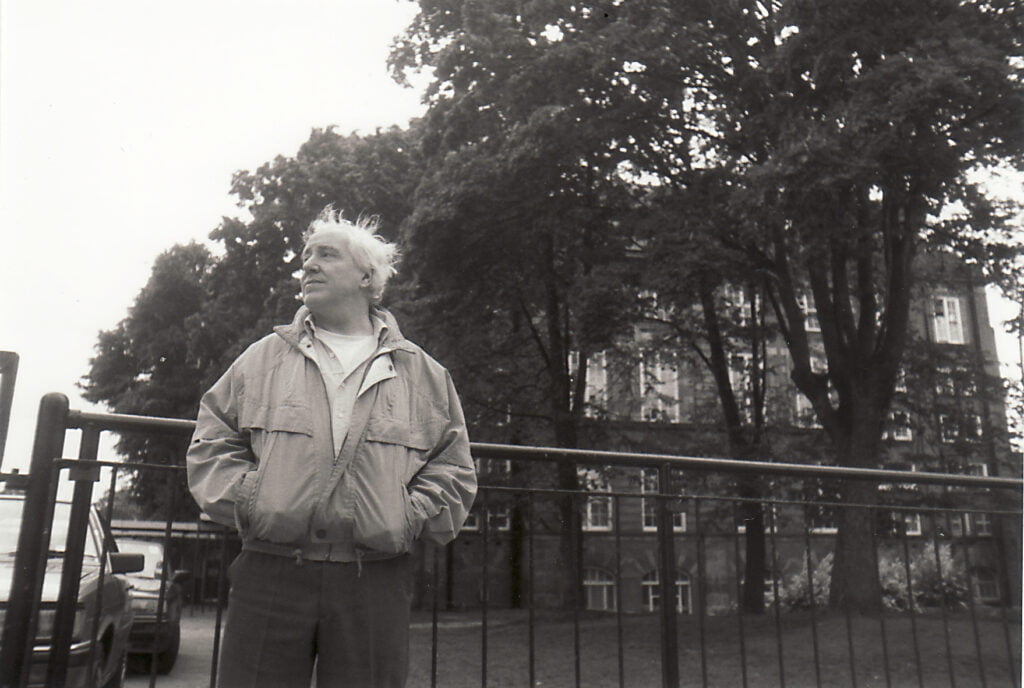
David Noades has kindly supplied a photo of Larry from when we revisited Holloway School in May 1993
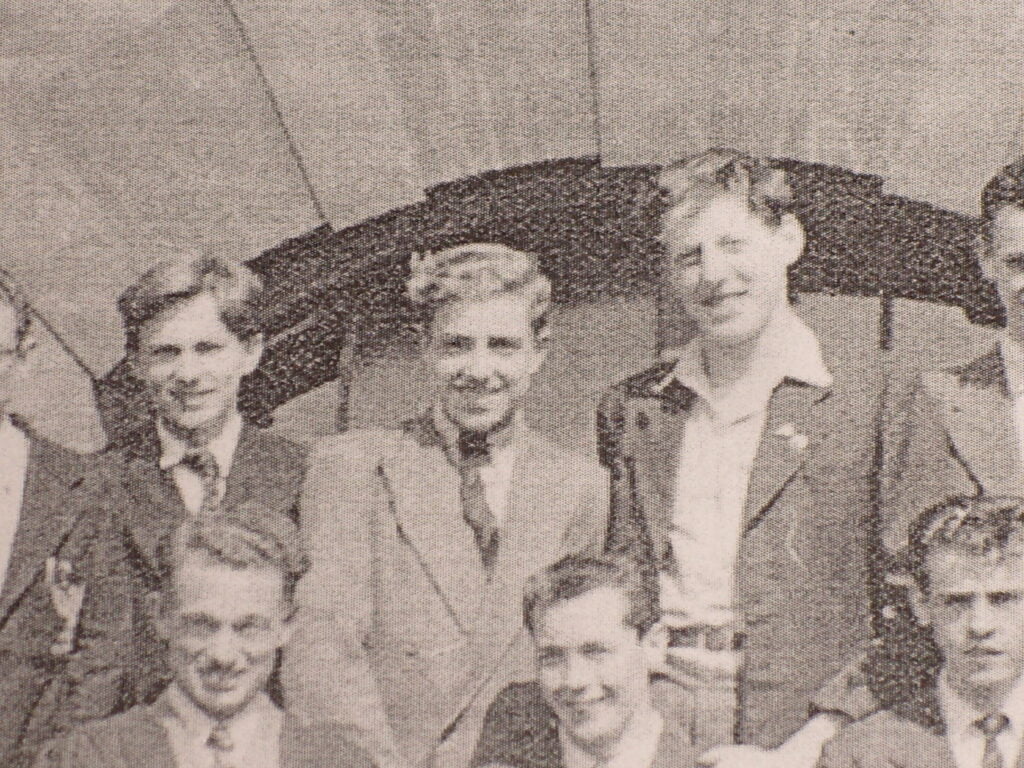
and one of Larry at school circa 1952.
Our sincere condolences to his son, David and his family at this difficult time.
Ray Rowe
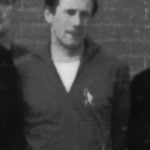 It is with great sadness that we learned of the passing of Peter Norris, a former teacher at Holloway School, at his home in Ewell on the 9th of December 2018, aged 78. Peter was a highly respected and well-liked PE teacher at the school in the 1960’s and was a strong supporter of the Old Camdenians, regularly playing cricket for the club’s 1st XI. He was a good batsman with aspirations as a spin bowler. He coached the school football teams, and later became coach for the London Grammar Schools football team, in which Bobby Cairns and Bobby Hartley played. Peter liked the blues and he regularly attended Klooks Kleek, the jazz and rhythm n’blues club, in West Hampstead where sixth formers would often see him.
It is with great sadness that we learned of the passing of Peter Norris, a former teacher at Holloway School, at his home in Ewell on the 9th of December 2018, aged 78. Peter was a highly respected and well-liked PE teacher at the school in the 1960’s and was a strong supporter of the Old Camdenians, regularly playing cricket for the club’s 1st XI. He was a good batsman with aspirations as a spin bowler. He coached the school football teams, and later became coach for the London Grammar Schools football team, in which Bobby Cairns and Bobby Hartley played. Peter liked the blues and he regularly attended Klooks Kleek, the jazz and rhythm n’blues club, in West Hampstead where sixth formers would often see him.
He moved to Glyn County Grammar School as PE teacher and became in charge of football there. He also regularly played football and cricket for Old Glynians. He was a good friend of Dario Gradi, a former teacher at Glyn School and later a successful football manager. Peter shared digs with him above Dario’s sports shop in Ewell High Street for many years. He became the coach of Epsom & Ewell FC (1969-71) and his love of sport remained with him all his life. He was a committed teacher and a great football coach who had a deep knowledge of the game. He had a reputation of having a strong personality who was as hard as nails and who demanded the best from his pupils and his players. He will be remembered as a kind, committed man, who was good company and who cared about and wanted the best for others. He will be sadly missed by all those who had the pleasure of knowing and working with him, both north and south of the Thames. ” RH
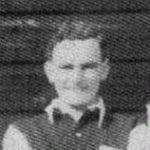 Vic died in 2000 after a fall. He had spent most of his working life employed at a multi-national oil company. During the war he served with the King’s Own Yorkshire Light Infantry and the 1st Battalion Royal Northumberland fusiliers.
Vic died in 2000 after a fall. He had spent most of his working life employed at a multi-national oil company. During the war he served with the King’s Own Yorkshire Light Infantry and the 1st Battalion Royal Northumberland fusiliers.
He rose to rank of major and was awarded a MC for bravery in 1945.
During the Suez crisis Vic was recalled from Civvy street to join the military forces where he took control of the whole oil distribution process during that period.
A regular attendee of Old Boys dinners, Vic was forthright in his opinions and as Chairman of the Governors of a local school, a solver of problems.
Frank joined Holloway in 1938 and so spent his first year at the School under the old pre-war regime. In 1939 he was evacuated to Towcester with the School, being billeted at Yardley Gobion but returned to London after a relatively short stay to attend the North London Emergency Secondary School (William Ellis). Because he was in his pre-matric year, when Holloway returned to London, Frank remained at William Ellis but following matriculation he left school to start work at London County Council. Whilst there, he began studies at the London School of Economics, firstly as an evening student and then full time. On gaining his degree he changed careers, joining the Midland Bank as a graduate trainee.
Whilst Frank spent comparatively few of his formative years at Holloway, he became an enthusiastic Old Camdenian, serving on the Committee and playing football for the club.
It was during his early days at the Midland Bank that Frank met his wife, Mary, a teacher. Following the birth of their first child, they moved to West Wickham in Kent, Mary’s home territory. Here they raised their family of a son and two daughters.
Frank had, by now, stopped playing regularly for the Old Camdenians and became a member of a Midland Bank team, which he eventually captained and which achieved considerable success in winning prestigious trophies at that level of football.
At the bank he made excellent progress, culminating in a senior position as the manager of a principal West End branch.
As a young man Frank was a keen walker and member of the YHA. He retained his love of the countryside throughout his life and later became an enthusiastic caravanner and toured extensively with his family.
A Rotarian, he served as an officer for many years, taking a leading role in charitable work, in particular the soup kitchens for London homeless.
All these activities were undertaken with enthusiasm and thought which, coupled with his even temper and shrewd judgment, made him an ideal leader and organiser.
Throughout his life, which ended sadly with a severe loss of memory, he was encouraged and supported by Mary and their family, for whom he had the greatest affection.
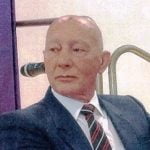 The funeral of George will take place on Monday 8th. March, at 11.45.am. at Islington Crematorium, 258, High Road Finchley London N2 9AG
The funeral of George will take place on Monday 8th. March, at 11.45.am. at Islington Crematorium, 258, High Road Finchley London N2 9AG
Donations to RNLI ‘The George Panayi Forever by the Sea Tribute Fund’ https://georgepanayi.muchloved.com
George Ives and Dr Raymond Rowe will be representing the Old Camdenians – owing to Covid-19 restrictions. Contact admin@oldcamdenians.info for details of the ‘live stream’ ID Code and password
GEORGE COSTAS PANAYI (1942-2021)
George Panayi, civil and electrical engineer, was born in Coventry, on 14th January 1942. Two years later the family moved to London and George went to Holloway School (1955 to 1959). George loved sport, especially football and cricket. In 1969, George married Angela and soon Adele and Anthony were born. George would play football for the Old Camdenians (OC) every Saturday afternoon; then running the bar afterwards. On Sunday mornings George would be back at the grounds mowing the pitch and doing odd jobs. Anthony also played football for the OC. George was a keen scuba diver and took part in many dives around the world. As a stalwart supporter, and member of the OC Committee, George loved talking to the students on exam results days and during the OC’s Annual Reunion Lunches and Dinners.
George followed many others by joining the Old Camdenians via the football club, after leaving school in 1959. From the outset, he was always full of energy, enthusiasm, and encouragement, which continued throughout a career spanning at least 25 years, mainly with the club’s lower sides and the Veterans XI. Initially, he was a successful goal poacher, which occasionally resulted in the ball skidding off his shiny, prematurely bald, head past a startled goalkeeper – alas sometimes his own! Later he reverted to a more defensive role, adopting a strict, but always fair, ‘Thou shalt not pass’ approach.
George was also an occasional cricketer, who never failed to turn out if any side was short. Moreover, he and his ever-supportive wife, Angela, were among the cricket club’s touring party to New Zealand in 1987, where he took on the role of team manager for the football matches arranged as ‘relaxation’ from the cricket schedule.
Off the field, his commitment to Old Camdenians was just as evident by his willing involvement with work at Burtonhole Lane and by his support for fund raising events. He was particularly proud of his appointment as Chairman of the OCFC for several successive seasons. This led to his election onto the main OC Committee, where his common sense and plain speaking were greatly valued for many years.
In short, George was a great clubman, whose contribution will never be forgotten, and whose sense of humour and sociability will be much missed by all who knew him.
Alan Meyer and Ray Rowe
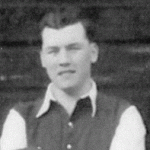 He attended Holloway School from 1939-46 and died on 16th December 2000, aged 74, after a long illness.
He attended Holloway School from 1939-46 and died on 16th December 2000, aged 74, after a long illness.
Ken was a prominent member of the Old Camdenians Football and Cricket Clubs during the 1950’s and the early 1960’s.
An uncompromising centre-half Ken, flanked by Tom Head and Dave Metzger, formed a formidable defence in the 1st XI of that time.
A more than useful all round cricketer, he played 174 games forr OCCC, 113 of which were in the 1st XI at a time when he was competing for a place with the likes of Yates, Simpson and Wing!
Bill Wraight
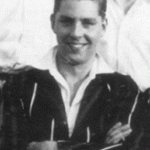 Old Camdenian cricket lovers in particular will be saddened to learn of the death of Ken Pearce. Ken was one of a small band of pre-war players who met in 1947 to reform the cricket club and was a regular player during the 50’s and 60’s.
Old Camdenian cricket lovers in particular will be saddened to learn of the death of Ken Pearce. Ken was one of a small band of pre-war players who met in 1947 to reform the cricket club and was a regular player during the 50’s and 60’s.
A good medium paced stock bowler, he could be relied on to be among the wickets, or, if opposing batsmen were proving difficult to dislodge, he would keep down the runs. He also produced plenty of runs from his own bat.
Ken died in 1999
Our sympathy and best wishes go to Joan who could always be found at Bow Lane helping to prepare teas when ken was playing.
CF
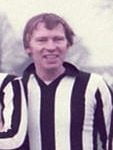
The tributes to George reflected how much he enjoyed the company of others, and of being part of a team. For the OCFC, his energy and enthusiasm were infectious, and his sense of loyalty to team-mates, and the Club, always paramount. For example, it was invariably George who would rescue misdirected footballs from the river at the Elms, Walthamstow; or who would ferry injured players to hospital and return them home after treatment. Moreover, when the Club was running up to eight elevens, he performed wonders as Team Secretary, leaving no stone unturned to ensure each team fielded a full complement. As a player, George’s finest hour probably came for the 3rd XI in the 1958/59 LOB Cup Final by scoring a hat-trick of breakaway goals, each a ‘one on one’ situation, thus terrorising the opposing goalkeeper in the process. Perhaps, though, for many of us, the abiding memory of George is of him relaxing on a bar stool at Burtonhole Lane, a pint of lager top in one hand and a Rizla roll your own in the other, waxing lyrical about the day’s game, and the fortunes of his beloved Chelsea in particular.
George was a great club-man and a proud Old Camdenian, whose friendship will be greatly missed by all who had the privilege to know him.
George died in 2017.Our thoughts remain with Jenny and her supportive family at this sad time.
Alan Meyer
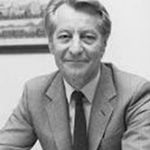
Robert Arthur Pinker was born on 27 May 1931, the son of Joseph and Dora Pinker. In 1955, he married Jennifer Farrington Boulton, who died in 1994; they had two daughters.
Bob grew up near Tufnell Park and attended Holloway County School where he excelled. His teacher, Mr. Dixon wanted Bob to stay on in the sixth form but Bob’s parents were not of the same opinion, because they couldn’t afford it. Mr. Dixon personally persuaded Mr & Mrs Pinker to allow Bob to stay on for the sixth form and go to university.
He took a certificate in Social Science and Administration at the London School of Economics in 1959, followed by a B.Sc. in Sociology and M.Sc. in Economics. He did his National Service in the Royal Ulster Rifles.
His academic career took him from lecturer at North-Western Polytechnic 1962-64 to Head of Sociology at Goldsmiths College (1964-1972), with a strong emphasis on social policy, to a Chair in the Social Policy Department at LSE. He was also Pro-Director of LSE (1985-88) and Pro-Vice-Chancellor for Social Sciences at the University of London 1989-1990. He was Lewisham Professor of Social Administration, Goldsmiths and Bedford College (1972-1974), Professor of Social Studies, Chelsea College, University of London (1974-1978), Professor of Social Work Studies, LSE (1978-1993), including Departmental Convenor (1982-1985), and Pro-Vice Chancellor for Social Sciences and Continuing Education, University of London ((1989-1990), and Professor of Social Administration, LSE (1993-1996). Member of Goldsmiths’ Council 2001 to 2007, elected a Fellow of the Society of Editors in 2004 and received an honorary doctor of laws (LLD) degree from the University of Ulster in 2016. The Social Policy Society awarded him their Special Recognition Award in 2015.
Bob’s published works include English Hospital Statistics 1861–1938 (1964), Social Theory and Social Policy (1971), ‘The Welfare State: a comparative perspective’ 1973, The Idea of Welfare (1979), Social Work in an Enterprise Society (1990), and, with R. Deacon and N. Lipton, Privacy and Personality Rights (2010). He chaired the editorial board of the journal of Social Policy from 1981 to 1986.
Outside of academia, Bob was a founding lay member of the Press Complaints Commission (PCC) and sat on the PCC from 1991 to 2004 and he was acting chair for the last year of his tenure. He was a member of the Advertising Standards Authority and a Privacy Commissioner for a decade from 1994. In 2005, he was appointed a Commander of the Order of the British Empire (CBE) in recognition of his public service. He had been elected a Fellow of the Society of Editors the previous year, and in January 2021 was awarded the Astor Award for Press Freedom by the Commonwealth Press Union Media Trust.
After retiring from the PCC in 2004, he served for two years as Chair of the Bosnia-Herzegovina Press Council, the first such body in the Balkans, and had continued helping to establish press councils in overseas countries, including Sri Lanka and South Sudan.
Days before his death on receiving the 2020 Astor Award for Press Freedom, Lord Black of Brentwood, Chair of the CPU described him as, “An indomitable champion of free speech, free press and of self-regulation. His work not only just strengthened press freedom but – as a result – strengthened the Commonwealth, too.”
Bob was approachable to all and a man of many interests outside academic and public life. He was a great conversationalist, a good listener and extremely kind and supportive of many who turned to him for advice.
Bob’s party piece was performing a music-hall number, with his thumbs in his braces, at an impromptu sing-along at conferences. He confessed that he’d thought about a career in music hall, but had opted to become a probation officer instead!
He followed the fortunes of Chelsea FC and had an encyclopaedic knowledge of professional boxing. He also loved old motor cars and for many years the family car was a Daimler. He was self-effacing and listed his recreations in Who’s Who as “reading, writing and unskilled gardening”.
He often reminisced about his upbringing in north London and always enjoyed traditional, family home cooking. He regularly attended the Old Camdenians annual dinner and considered a good, shop-bought, fish and chip supper a special treat.
The determination and impact of one special Holloway School English teacher, Mr. R. G. Dixon, by taking extraordinary measures, made it possible for a local boy to achieve international recognition
His wife Jen, to whom he was devoted, died 25 years ago after 25 years of marriage. They had two daughters, Cathy and Lucy, as well as grandchildren and great grandchildren. They were the centre of his life and he filled his house in Blackheath with books, conversation, and laughter.
Bob was a special man who will be much missed.
He died aged 89 on the 2nd of February 2021.
 Ken who attended the School from 1926 until 1930, was a stalwart of the Camdenians Football Club and played from 1949-57. An outstanding defender, generally at left back or centre half, he was also a first class Captain. He was particularly good at welcoming “new recruits” to the Club, and making them feel at ease and “part of the team.”
Ken who attended the School from 1926 until 1930, was a stalwart of the Camdenians Football Club and played from 1949-57. An outstanding defender, generally at left back or centre half, he was also a first class Captain. He was particularly good at welcoming “new recruits” to the Club, and making them feel at ease and “part of the team.”
Ken was also involved with the acquiring and setting up of the Mill Hill Ground and was one of the original Trustees of the Camden Playing Fields Trust. Until recent years, he was a regular attender at the Annual Dinner.
He trained and qualified as a Quantity Surveyor and served with the Royal Engineers in Italy as a Surveyor notably in and around Venice. It was whist in Army Training at Catterick he met, and proposed to Betty, who he later married and who survives him.
After war service he returned to the construction Industry and was involved the re-building of many of the badly “blitzed” cities. He also played a prominent part in the construction of the “Festival of Britain” site on the South Bank.
Latterly he set up his own private practice and continued in this capacity until retirement.
I remember him as one of the first Skippers I played with, and always admired him for his sportsmanship, enthusiasm, friendliness and a very “dry” sense of humour
Sir Leslie Porter was born on 10 July 1920 in London, to Henry and Jane Posament. He grew up in North London and went to Holloway School, leaving at the age of 14 to join a West End firm of car dealers, HR Owen Rolls Royce dealers, where he demonstrated his ability in sales. He joined the family owned textile business, J. Porter & Co., in 1938, after completing his schooling at Holloway County School.
During the Second World War, Leslie served in the King’s Royal Rifle Corps in Egypt, Greece, Crete, Libya, Tunisia, Algeria, and Italy, rising to the rank of Quartermaster Sergeant, in the 1st Battalion, The Rangers. He re-joined the family business in 1946 and immediately reorganised the operations and structure of the company to include linens for the home and furnishing fabrics. By 1954 the business was making a profit and in 1955, Porter was appointed as managing director.
In 1948, Leslie Porter married Shirley Cohen (appointed DBE in 1991), daughter to Jack Cohen, founder of the Tesco supermarket chain. Jack, impressed with Leslie’s success at J. Porter & Co. immediately offered him a job, however, independently wealthy and successful, Leslie did not make the move to Tesco Stores until 1959. Leslie and Shirley Porter had two children, John and Linda.
Leslie joined Tesco Stores as a Director and Head of Home ‘n’ Wear department in 1959. His success in the developing non-foods divisions for Tesco led to his appointment as Assistant managing director in 1964. Leslie and Cohen often clashed over business operations, and management styles; many of their boardroom clashes becoming anecdotal stories in the business world. Leslie is credited with the successful restructuring Tesco, and implementing a sound business strategy which has ensured the continued success of the business.
Part of the success and expansion of Tesco Stores was the physical restructuring of stores; opening bigger stores in more significant locations, and essentially the creation of supermarkets in the United Kingdom. Under the leadership of Leslie, Tesco expanded their range of services to customers and the group now operates in food, non-food retail, financial services, telecommunications and property development.
In 1977, Leslie oversaw the decision to stop participation in the Green Shield Stamps program which had been running since the 1960s. The move enabled Tesco to save £20 million per year, which the company was able to use for grocery price reductions. He and the management team, launched Operation Checkout in 1977, aimed at passing on retails savings to clients.
In 1970, he was appointed as Deputy chairman. He was managing director between 1972 and 1973, and chairman from 1973 until 1985. Leslie was President of Tesco Stores from 1985 until his retirement in 1990. He was awarded an Honorary PhD in Business Management from Tel Aviv University in 1974.
Leslie was knighted in 1983, and appointed to the Order of St. James in 1992.
Sir Leslie retired with his wife Dame Shirley to Israel, in 1993 and was actively involved in philanthropic activities until his death in 2005. Their involvement included among others the Porter Foundation, and a number of charitable organisations in Israel and the United Kingdom.
In 1993, Leslie was appointed as Chancellor of Tel Aviv University. During his tenure, he and his wife set up several scholarship funds at the university, as well as working to expand the university premises by donating funds for the Shirley and Leslie Porter School of Cultural Studies, Porter Institute for Semiotics and Poetics, the Cohen-Porter United Kingdom Building of Life Sciences and the Cohen-Porter Family Swimming Pool.
Care for the elderly and services to benefit the elderly formed a large part of Porter’s philanthropic activities in the United Kingdom, through the Porter Foundation and in Israel, with the funding of the Porter Senior Citizen Centre in Jaffa.
Sir Leslie Porter was a supporter of the arts, with his endowment of The Porter Gallery at National Portrait Gallery, and funding for The Porter Gallery at the V&A, as well as the Royal Academy.
He died on 20th March 2005.
RH
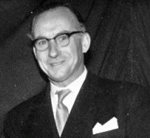
Henry was the son of a builder’s labourer and was born in London. He attended Hungerford Road School and Holloway County School but left at the age of 15 to join a paper manufacturer. Later, he set up his own business, Price, Topley and Company Ltd, who were paper merchants.
He became an active member of the Conservative Party and, in 1944, he was co-opted as a member of Lewisham Council, elections having been suspended for the duration of the Second World War. He enjoyed municipal life and, in 1946, he was chosen as Conservative candidate for Lewisham West for the London County Council. He was elected by 578 votes. This gave Henry a prominent role in London-wide Conservative politics. After boundary changes, he was re-elected in 1949.
At the 1950 general election, Henry was chosen as Conservative candidate for Lewisham West. He gained the seat from Arthur Skeffington, who had held it as a Labour MP. His maiden speech on 22 May dwelt on the subject of high housing rents; he urged that the period for repayment of public works loans be lengthened from 60 to 80 years. Fighting for re-election in 1951, Price reported that his audiences were “flabbergasted” to learn the high level of spending by the Labour government.
After his re-election, Henry was appointed Parliamentary Private Secretary to Geoffrey Lloyd. In September 1952, he volunteered to spend a week with trainee miners in the Kemball Training Centre, near Stoke-on-trent. Afterwards he was critical of the sleeping arrangements in the miners’ hostel. He was chosen to second the “Loyal Address” after the Queen’s speech, traditionally a role given to rising MPs on the government backbenches.
Henry was critical of the facilities available to MPs, claiming to work over 100 hours a week but that his pay amounted to 2s per hour; he said that MPs were “treated like grubby office boys”. He was a member of a Parliamentary delegation to NATO in 1954. Henry was involved in organising the presentation to Winston Churchill of a portrait by Graham Sutherland to mark his eightieth birthday; this gift backfired as Churchill hated the portrait and his wife had it burnt.
In December 1954, it was announced that the London County Council would be seeking a compulsory purchase order for his home in Forest Hill for a new housing scheme. Henry was critical of the way trade unions operated, claiming in a speech in February 1956 that a majority of workers in the country were forcing inefficient working methods on management. In April that year, he had the idea for forming a “Middle Class Alliance”, which was quickly established. He declared the aim of the Alliance was not selfish but “to preserve the middle classes for the service of the nation”.
Henry’s term as Chairman of the Alliance came to an abrupt end in early 1957 when he offered his resignation after a split; two executive members who were supporters of the Liberal Party had been planning a breakaway. On 18 March, the Alliance was formally dissolved. He spent a great deal of time in the late 1950s opposing the Rent Act 1957.
“Indifferent health” forced Henry to announce in July 1961 that he would not be a candidate at the next general election. He was appointed a O.B.E. in 1962. Late in his Parliamentary career, he attempted to amend the London Government Bill to stop the merger of Lewisham with Deptford to create the London borough of Lewisham. He rebelled against the whip on the abolition of resale price maintenance in 1964.
He became Managing Director of Grove Paper Company Ltd. after leaving Parliament in 1964 and died on 4th December 1982.
RH
It is with great sadness that we learned of the passing of Ken Ranson, our Honorary Life President and former Chairman, on the 11th of February 2022, aged 89. Ken never fully recovered from breaking his hip and succumbed to cardiac failure in Broomfield Hospital.
Ken was born on 12th September 1932 and attended Holloway School (1945-49). During WWII he was evacuated to Towcester along with the rest of the school. He spoke fondly of his experiences and time there. During his National Service he boxed for the Army and was stationed at Windsor Castle, where he lived a charmed life. Whilst others were awoken from their slumbers with shouting, our Ken was told that his eggs and bacon were ready!
As Chairman of the Old Camdenians’ Club, Ken always looked forward to meeting with the Year 11 students on their Exam Results Day in August, welcoming them as ‘New Old Camdeninans’ and talking with them about their own aspirations in life. He was disappointed that he could not attend George and Pam Ives’s farewell Annual Lunch last year, but he saw all the photos on our website.
Ken was a big man with a big heart. He was always willing to listen and give sound advice and counsel; Ken was a true friend to me during his time as Chairman. He will be sadly missed by all who knew him. Our sincere condolences go to his family at this time.
Ken’s funeral was held on Thursday 24th February 2022, at 3.30pm, in the East Chapel, at Golders Green Crematorium, 62 Hoop Lane, London, NW11 7NL
Alan, Janet and Lesley Meyer; Martin Quilter and Dr Ray Rowe represented the Old Camdenians. Martin and Ray joined the family and friends at the reception, at Old Bull and Bush where Ray said a few words in tribute to Ken.
Please see the Tribute Link:- https://kennethranson.muchloved.com/ for donations.
Dr Ray Rowe
Eulogy from Amanda Wolsey – Ken’s daughter
Known as Ken, dad, and Gaffer
Ken was born on 12th September 1932 and spent his early years living in Holloway Road where his parents had a sweet shop. When the 2nd world war broke out he was evacuated, along with his older sister and younger brother to Cornwall. Ken and Eric spent their time on a sheep farm and he had fond memories of his time there.
He returned to London in 1945 where he attended Holloway Boys School until 1949. He maintained his ties with the school and was made lifetime president of the Old Camdenians Club following his time as Chair of the old boys club. Ken left school to join the family business of wholesale tobacco, confectionary and sundries from the warehouse that had grown from the sweet shop.
He attended Sunday school at Upper Holloway Baptist Church where he later married his ‘darling wife’ Pat. They enjoyed 43 years of married life sharing their love of dancing and each other.
He joined the scouts at the church and remained in scouting for many, many years. He was awarded the Kings Scout honour, became a venture scout leader and eventually took on the role of District Commissioner for the Haringey Scouts. In 2002 he was given the silver acorn recognising his 30 years in scouting.
Ken did his National Service with the army which suited his character of strict discipline and high standards. It was always important to him that things were done ‘properly’. He represented his regiment in the boxing ring and was very successful. There is a story that he could have boxed Henry Cooper, who later became Heavy weight champion of Britain, the Commonwealth and Europe. However, the camp where Henry was stationed had an outbreak of smallpox and if Ken had gone to fight he would have had to stay in quarantine for 6 weeks. As Ken had leave booked for a couple of weeks later, he chose not to accept the fight.
Keeping fit was always a huge part of Ken’s life, from the weights in the garage that he regularly used; playing football as often as possible either for a Sunday league or a kickabout in the park; walking instead of driving for example, when the family went to visit local friends on Sunday afternoon Pat would drive with the children and Ken would walk and meet them there.
Ken was never one to refuse a challenge of any kind including when his friend said that he couldn’t walk from his house in Bounds Green North London to his friend’s house in Fleet, Hampshire he got up at 3am, walked the 50 something miles only to find that his friend had gone away for the weekend!
Ken was a lifelong Arsenal supporter and had a season ticket for a seat in the East Stand next to his dad and brother which he kept until his health and mobility declined and he could no longer travel to the stadium. He continued to watch them on television and ensured he had BT TV so he could watch all the games.
He was a proud Freemason dedicating his time and energy during all his adult life to the brotherhood. He was rewarded for his loyalty and service by being elected to receive the honour of the 32nd degree for which he was both delighted and humbled.
Ken also had a creative side; he was a talented artist in drawing with pencil and charcoal. He could sit at a piano and play tunes by ear. On family camping trips to the British seaside he would spend time on the beach building a speed boat or sports car from the sand, big enough for his 4 children to sit in.
He was dad to Lorraine, Neil, Carolyn and Amanda and ‘Gaffer’ to his 10 grandchildren. When he became a grandfather, he was adamant that he didn’t want to be called Grandad or Grandpa. He talked about being called ‘Guvner’ like he was at his own wholesale confectionary company in Tottenham, but Pat soon put a stop to that idea. When he came up with the idea of being called ‘Gaffer’ it seemed appropriate because the dictionary definition was ‘head of the family’.
When he sold his business and finally retired, he didn’t really stop working. He joined lots of committees and associations, for example the Bounds Green Residents Association, The Alexandra Park and Palace Committee, The Monday morning Scout Park clearing crew.
Unfortunately as his age advanced his health declined and he had to relinquish those positions. He could no longer enjoy cruise holidays or spending too much time away from home. He still enjoyed the company of his family including by now his 11 great grandchildren.
Since his passing people, have referred to the help and support he gave them, his wise counsel and big heart. Sadly, that big heart let him down at the end and he left us. But he has left us with the memories and love which we will treasure forever.
I also have to record the passing of Bertram Rentell in 1996, who always took an interest in the Club and was one of the oldest regular attendees at the dinner.
Bertram was a collector of Old Boys memorabilia and he has passed on to me many programmes, photographs and souvenirs of life in pre-war Holloway.
Richard Brown
Members of the post war cricket team will be saddened to hear of the death of Len Renton, who was a regular member of the first team during the 50’s. Len could bowl what were called ‘cutters’ with the added advantage that he was accurate.
Len was also well known to the dramatic society for the splendid sets he created and painted. As a distinguished artist len was president of his local art club in Bournemouth and held a number of exhibitions.
His wife Betty was among the band of ‘tea ladies’ at Bow lane for home cricket matches and his daughter, Elizabeth, spent much of her childhood running around the ground whilst dad played.
We’ve just been informed by Lionel Francis that Colin Richardson died peacefully after a lengthy illness on Friday November 11th 2012, at the age of 84 in Ottawa. In his retirement he obtained a BA in History from the University of Ottawa.
He went with the Holloway School evacuation to Towcester during the war years and was with Tanks during his National Service.
He was predeceased by his elder brother who also attended Holloway School and whose picture may be seen wearing a school blazer in the top row of the group photograph of the 1936 school camp in Chideock (See Display Cabinet).
Jim Ritchie came to Holloway School to teach physics in the 1950’s, having gained his mathematics and physics degree by part time study at Birkbeck College. He brought to the department and to White House, energy, enthusiasm, humour, patience, persistence and a deep understanding of young people. He loved to teach and to learn.
Jim left Holloway to take up the appointment of schools Science Advisor. he visited schools in Holland, and such was his character and expertise that in recognition of his services, the Queen of the Netherlands appointed him a Knight of the Orange Order.
Retirement gave him the opportunity to enlarge his numerous activities. He was an avid bee keeper. He studied Latin, revised and retained his Morse code learnt as a wireless operator with the RAF during the war. he acquired a deep interest and knowledge of New York’s Brooklyn Bridge. At home he was a keen gardener, husband and grandfather and for the family’s entertainment performed as an amateur magician. Jim was reigning champion at Southgate and Palmers Green Bowling Club. He worked and played to a high standard. He faced every day with optimism, enthusiasm and a smile. Truly a great teacher and a very remarkable man sorely missed by all who knew him.
ATB
The Media has covered most of George’s public life: most of it is true, so my ramblings are purely personal.
His Mum died when he was three, leaving his Dad with a brood of six children – George the baby of the family – a fact he continually bragged about – and the only boast he ever made. Nell, the eldest girl, brought the family up, without any aid from Social Security, which didn’t exist.
He captained the Pooles Park Junior Boys’ invincible soccer team of scruffs, and a London Evening paper got wind and sent a reporter and photographer. We all got our ‘photos took’.
A London County Council scholarship followed, aided by a brilliant English essay, which was taken round the school and fed into the awestruck ears of both boy and girl sections.
The four months difference in age, meant that I joined Holloway a year later, so didn’t reconnect with George until we were evacuated to Towcester at the out-break of war.
Stan Heritage – another Holloway legend – was once heard to declare that the years of evacuation were the happiest days of his life. Amen to that!
A born leader, George didn’t realise his own potential until Rex King, that shrewdest of schoolmasters and second in command of the school A.T.C. unit, promoted him to Corporal. He never really liked giving orders, and although responsibility changed him, he never lost his charisma. He became focused, got his head down, and for Matriculation produced a Distinction in English Literature; a rare enough event:- but surely not from Remove B!?
After the last school summer forestry camp in Burnham Beeches, near Slough, we returned to London, ready for the 1943 Winter term. George and I joined the 6th form, he captaining an unbeaten 1st X1, and me an unbeaten 2nd X1.
During the Christmas break, we became temporary postmen, delivering parcels around the Caledonian Road, from a horse and cart, in freezing weather. I decided to volunteer for the Royal Navy, left school, but always kept in touch throughout our Service careers; he as a Navy P.T.I. and me as an A.B. (Radar).
After demobilisation, our families having moved into the Haringey area, mine as a result of bombing, made it easy for him to drag me out on Sunday mornings and train in Finsbury Park. He injured his knee once, so we spent an entire Sunday morning practising penalty kicks. I have recently learned from his wife Kate, that he became the ‘Spurs stand-by goal-keeper: substitutes weren’t then permitted.
Living at home, while attending Borough Road Teachers Training College, enabled him to carry on playing for Finchley F.C., in the Athenian League, and play cricket for the O.C.’s, frightening the life out of Dennis Steel behind the stumps, with his hostile bowling, and thumping the ball to all parts with the bat.
His first game with Spurs was, as an amateur, on Christmas Day 1951 away to Charlton Athletic. When George scored in the three nil victory, the Holloway ‘Yell’ of ‘Orney-Okey’ floated across the Valley, and to say that he looked startled would be an understatement. The cry was our Towcestrian adaptation of a London street cry, but never really understood what it meant.
Somewhere along the way he managed to accumulate about eighteen England Amateur caps, including the 1952 Helsinki Olympics.
I usually did my pre-season training with Finchley, and one of the committee members sponsored a Youth football team on a nearby Council housing estate, and needed someone to coach them. George persuaded him – and me – that I could do it, opening up a new challenge in my life.
In June 1953 he signed a contract as a professional with Spurs, but insisted on a clause allowing him to continue with his full time teaching. Kate, his wife, told me that the Headmaster of Christ’s College, Finchley, would allow him the Friday afternoon off, if he had an away match on Saturday.
On Monday, November 23rd 1953, Tom Finney, the England outside-left, pulled out of the team with a groin injury. George was picked to play against the Hungarian Amateur X1 at the Wembley Stadium with barely two days notice. The rest is history!
He once confided in me that he would never allow himself to slide down the football ladder once his first team career was finished. As good as his word, he saw out his contract with Spurs before moving to Ardingly, spending the rest of his career teaching at Ardingly College.
I stayed a couple of times with Kate and George when working in the Crawley area and Pam, my wife, and I visited them when George was well into his Vascular Dementia.
He
died on Christmas Day 2011, exactly 60 years after his first game for Spurs as an amateur, but still the last of the Gentlemen Footballers.
Ernie Law
Sorry to have to inform you that we lost George over Xmas. Further details to follow.
The Funeral for George will take place at 2:30 on Friday 13th January at St. Peters Parish Church, Ardingly, Sussex.
Obituary (posted on the Spurs website)
We regret to announce the passing of our former player George Robb who died on Christmas Day, aged 85.
George was one of the last of the ‘gentleman footballer’s’ who combined his football with a career in teaching.
He started out with Finchley as an inside right and was switched to outside left whilst serving with the Royal Navy.
George first signed amateur forms for us during August, 1944 and re-signed seven years later. He made a goalscoring Football League debut on Christmas Day, 1951 in our 3-0 win at Charlton Athletic and signed part-time professional forms for us 18 months later.
George went on to score 53 goals in 182 First Division appearances in our colours until October, 1958, plus five in 18 FA Cup games. An injury sustained in the London 5-a-side tournament ended his playing career.
He gained a single Full England cap versus Hungary during 1953 having previously played 18 matches for the England Amateur XI. George also played in three England ‘B’ games and gained representative honours for the Football League XI, Great Britain Olympic XI, London FA, Middlesex FA and the Athenian League XI.
George combined his football with a teaching career which spanned nearly 40 years. He was sports master at Christ’s College, Finchley from 1952 until 1964 and then spent 22 years at Ardingly public school, Sussex until retiring during 1986.
George, who suffered from Vascular Dementia in recent years, had lived at Ardingly, near Haywards Heath, for 47 years. He is survived by Kate, his wife of 51 years.
Our thoughts are with his family and friends at this sad time.
A biography can be found on Wikipedia.
http://en.wikipedia.org/wiki/George_Robb
It is with great sadness that I have to advise you of Alan Robinson’s passing on Monday 11th April 2022, aged 85.
Alan Robinson was born on 30th May 1936 and went to Holloway School (1947 to 1954). Alan was a stalwart supporter of the OCC who loved his cricket and football. playing sport for the club at all levels. Indeed, Alan held the office of President of AFC and Vice President of AFC, LOB and AFA. He was our Auditor for many years and ensured that our accounts were in order. Alan will be sadly missed! Our thoughts and condolences go to his son Colin.
Alan’s funeral is to be held on Wednesday 11th May, at 11.30am, at Golders Green Crematorium, 62 Hoop Lane, London, NW11 7NL The service will be streamed live and the link is posted below. Instead of flowers at the funeral we are asking for donations to Macmillan Cancer Support (https://donation.macmillan.org.uk)
Webcast order summary
Webcast details for the service for Alan Michael Robinson at 11:30 on Wednesday 11th May, at Golders Green East, run by Cooksey & Son are as below.
Watching webcast live and watch-again
Website https://watch.obitus.com
Username zuli7858
Password 605980
Webcast details
Webcast Live & Watch Again + Download Link AWAITING SERVICE
Service details
Venue 62 Hoop Lane
Golders Green
Booked by 190 Fortis Green Road
Muswell Hill
Please note: our webcast facility has a 150 viewer limit to maintain webcasts quality. If you’re expecting more than this, please notify us as we will need to make changes and there may be additional cost.
Watching webcast live
You will be able to view the live webcast approximately 5 minutes before the service start time. Please be aware the service is in a public building and earlier services may overrun. Please use your discretion should you see activities unrelated to the service you are here to view.
In advance of the service, we strongly recommend you log in to the site and test your internet connection.
We are grateful to Alan’s son Colin for allowing us to display his favourite image of them together – waiting at the crease!
Dr Ray Rowe
TRIBUTES FROM
Alan Meyer
Alan Robinson (1947 -54)
Alan and I both joined Holloway Grammar School in 1947, and remained classmates throughout our time there. Alan’s sporting abilities soon became evident, representing White House, and the School, at football, cricket, and athletics. On leaving school, he joined the Old Camdenians football and cricket clubs, the latter being where his talents really flourished. In a 40 year plus career, as a left-handed opening batsman, he amassed over 15,000 runs in approx. 900 appearances, including two 100’s, and fifty five 50’s. Moreover, as a wicketkeeper, he claimed over 550 dismissals, and ,even took five wickets in an innings several times when called upon to bowl his medium paced seamers. Perhaps, Alan’s crowning cricketing achievement came with the Club’s tours to New Zealand (1987), the West Indies (1989),as well as to Holland (twice), and Cornwall, all of which he was instrumental in organising, and, which , are still talked about today.
A busy career with the Lord Chancellor’s Department, as a travelling auditor on the County Court circuit, was followed by an equally active retirement. This included,13 years as a steward at Lords Cricket ground, and, becoming Treasurer of the Amateur Football Combination (AFC), the London Old Boys Cup Competition (LOB), and, later, the Amateur Football Alliance (AFA),- a trio of posts never previously held by one person at the same time. In addition, he was heavily involved in organising the AFC, annual, Dinner and presentation of trophies event, which all resulted in his,well deserved, appointment as AFC President for 2016-2018.
Alan was a very sociable character, who enjoyed the banter, and ,camaraderie of the dressing room. He regularly attended the OC’s Annual Reunions, where he would, invariably, wax lyrical, with contemporaries, over a bottle, or three, of wine, about the good old days. At the same time, he was always ready to help out with whatever needed doing, and was never afraid to speak his mind, particularly where unfairness, and, bad practice we’re concerned.
Alan spent many happy holidays abroad, often in Barbados renewing contact with former OCCC members. His full, and rewarding life has left all who knew him with a host of good memories, and greatly missing his friendship.
Our thoughts are very much with Colin, and, his family at this difficult time.
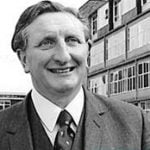
It is with deep sadness that I have to inform you that Tom Rolf passed away before Xmas on 11th December. Tom was Deputy Head of the School from 1961 – 1965. He was also heavily involved in the Old Camdenians cricket club and played for them the four years he was at the school. He went on several of the cricket tours, and remained in contact with the club after he left, attending several of the annual dinners.
Tom Rolf was deputy headmaster at the school from 1961 to 1965. He was a good teacher and quickly became a keen member and supporter of the Old Camdenians – in particular as a robust playing member of the O.C.’s cricket club. He was a big man physically with a loud booming voice and an exuberant character. He lived life to the full and was fun to be with. He preferred a pint of beer to half a pint. He was a family man and brought his family with him on tour. He contributed enormously to the spirit and enjoyment of being a member of a team. His rich sense of humour and friendly, happy disposition made him a favourite with everyone. He was not a man to call for a quick single, he would rather clobber the ball to any boundary line –irrespective of where his bat may be facing at the time. He will be remembered with happy memories by all those who have shared in his company. Tom had one great after dinner story, which has helped me out on many an occasion. He was a good man. We extend our sympathy to his wife, Janet and the girls.
Richard Brown
Tom Rolf. My father.
Tom Rolf, who has died aged 83, was a passionate advocate of comprehensive education, as befitted a man who believed strongly in equality of opportunity. After making his mark as a headteacher, he thrived as an education adviser.
“There was never any doubt about the principles Tom brought to work,” said his fellow adviser John Sterry. “When discussion wavered, he’d get to the heart of the matter in a few, sometimes sharp, words. I remember his shaming of one proposal by saying it sounded ‘acceptable only as education for other people’s children’ – words often quoted since.”
He was born in Salford, Greater Manchester, to Charles, a senior railway clerk, and Beatrice. After attending Stretford Grammar School for boys, he went to Hull University to study maths and geography. In 1952 he became a maths teacher at Lincoln city school. He found time for politics and was proud of his part in getting the Labour vote out for the 1955 general election.
In May 1957 he met his future wife, Janet, on a blind date. They married in December and Tom became head of maths at Colne Valley high school, the first purpose-built comprehensive in north England. He relished his new role, working with similarly idealistic young teachers.
In 1961 he and Janet moved to London, where Tom started as deputy head at Holloway School. Four years later, Tom returned to Colne Valley as headteacher. He led the school through challenges such as the raising of the school leaving age, a new examination system and a visit by the then prime minister, Harold Wilson. After 11 years, Tom became secondary education senior adviser in Devon.
In retirement, he played golf and was a governor at local schools. As the first signs of Alzheimer’s appeared, he became less active and life revolved around sport on TV, reading the Guardian and the odd trip to the pub.
He is survived by Janet, myself and my sister Jenny, and six grandchildren. His oldest daughter, Susan, predeceased him.
Linda Denton
Wed 16 Mar 2011
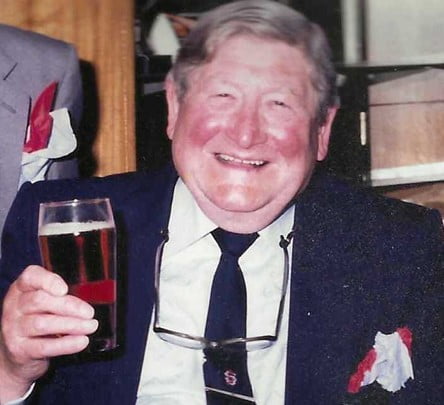
Arthur Rust was at the school from 1931-35. He was a regular attendee at Old Boys dinners. He was a happy conversationalist – none more so that when among his small band of contemporaries, Sid Hutchison, Bertrand Rentell and Dave Brown.
Arthur spent the WWII in India serving in The Royal Army Pay Corps, upon returning to England he joined Borthwicks, the international meat wholesaler. In the late 60’s he joined Remington Rand of typewriter fame and remained in Office Equipment for the rest of his career joining Rank Xerox in 1969 before retiring in 1983.
Although an Old Camdenian, Arthur spent most of his Old Boys football days with East Barnet Old Grammarians (EBOG). Prior to that he played for Merton in the Southern Amateur League in the 1950’s, during which his daughter Kathryn was born. Upon returning to the right side of the Thames he was involved in football administration and was the Chairman of The North London Combination League in the 1960’s and 70’s, this was mainly a parks league and at its peak the league had 5 divisions and over 55 teams.
His son Nicholas had gone to East Barnet School and played for EBOG, it was from there that Arthur had been involved so much in the Southern Amateur League and Old Boys teams. He was a great supporter at EBOG, not least in running the Saturday raffle for many seasons, and a permanent fixture in Codgers Corner after the games. He was awarded the FA 50 years services to football medal just before he passed away. He was also heavily involved with cricket and for many years was the Chairman of East Barnet Valley Cricket Club.
He was also a committee member of the Old Camdenians Club and his cheery, optimistic and practical contributions to Committee meetings will be missed. He was made Vice President of the Club in 1991.
To his widow, Sylvia we send our condolences.
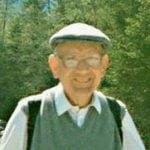 It is with great sadness that the family report the passing of Moses Schwab. He was born in 1919, and began his dental training in 1938 at the Royal Dental Hospital in Leicester Square. The ongoing war did not impede the program of study and he enjoyed relating how, during his training in the war years, a bomb once exploded very near the hospital. The windows of the hospital were shattered and the students arrived in the conservation department to find their instruments scattered in disarray all over the floor. He managed to gather his set together to good effect, as seen by the number of prizes he obtained during the duration of the course.
It is with great sadness that the family report the passing of Moses Schwab. He was born in 1919, and began his dental training in 1938 at the Royal Dental Hospital in Leicester Square. The ongoing war did not impede the program of study and he enjoyed relating how, during his training in the war years, a bomb once exploded very near the hospital. The windows of the hospital were shattered and the students arrived in the conservation department to find their instruments scattered in disarray all over the floor. He managed to gather his set together to good effect, as seen by the number of prizes he obtained during the duration of the course.
He began his career in 1942, and spent most of the next 40 years in general practice in Southgate. He was an ‘old-timer’ who won the respect of his patients by never compromising on his high standards, regardless of time pressure, and they in return regarded him not only as their dentist but also as their friend. He retired from the NHS in 1982, but carried on dentistry in more relaxed fashion at his surgery at home, mainly with children with whom he had a great affinity. He continued working until the day he became ill at the age of 83, and derived much satisfaction from making the comparison between his own practising career which spanned six decades, and the average retirement age in the profession of 54. He saw many changes during this time and his distaste at the relaxation of the rules on advertising was a sign of his professionalism – he always felt that this had helped to demote dentistry from a profession to a business.
He was an ‘old timer’ who won the respect of his patients by never compromising on his high standards, regardless of time pressure, and they in return regarded him not only as their dentist but also as their friend.
Until he was 80, he enjoyed hill walking in the British Isles and mountain walking in Switzerland. He enjoyed nature, music and sport, watching cricket and playing chess, and lived a full life. He leaves a wife and children, one of whom followed him into dentistry
by Johnathan Schwab
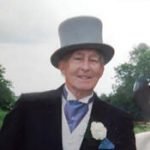 Paul was born on the 27th of April 1932.
Paul was born on the 27th of April 1932.
After leaving Holloway School, Paul entered the Royal Navy in 1949 where he served for 7½ years. In 1957 he joined the Irish Times and, in his 25 years with the paper, travelled widely on a variety of assignments including stories for the Racing Post – developing, no doubt, his taste for Guinness on the way!
Paul was a stalwart of the Club, wearing many hats for the Football, Cricket and Sports/Social Clubs and was a founder member of the Golf Society. His tireless efforts to balance the books at Burtonhole Lane included running the 100 Club and other fundraising activities. Without his dedication, the Ground could well have been lost long ago.
At his funeral, Paul, wearing whites and carrying his cricket bat, was taken by horse drawn carriage to the Crematorium from Burtonhole Lane. Afterwards, as he would have wished, his many friends gathered at the Clubhouse to toast his memory which included a round of Guinness. He will be greatly missed and we offer our sincere condolences to his daughter Kim, his son Ian and all the rest of his family on their sad loss.
Paul died in Hemel Hempstead General Hospital on the 12th August 2005 due to an infection relating to his treatment of lung cancer. He is survived by his sister Mignon, his daughter Kim and son Ian, plus 5 grandchildren, who will miss and love him always.
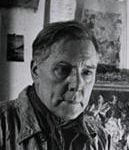
Elliott studied at Slade School of Fine Art, 1906-11, with Henry Tonks. He taught art at Holloway School and later took a remote shed in Westmorland for £2 a year as a studio, putting in his own windows, door and chimney. In World War I Seabrooke – a pacifist – served in the British Red Cross, won Italy’s highest award for gallantry and was an Official War Artist on the Italian front. He was tall and handsome, with a fine singing voice, which led to a thespian career.
He did much work with the directors Theodore Komisarjevsky and J B Fagan, and acted with John Gielgud, Lewis Casson, Sybil Thorndike, Wendy Hiller, Charles Laughton and Ralph Richardson. Also appeared in films, including Gabriel Pascal’s Major Barbara, 1941, but preferred the stage, which left the day free for painting.
He showed at New English Art Club, London Group of which he was vice-president and president during most of the 1940s, having had a first solo show at Carfax Gallery, 1912. Elliott was much influenced initially by Cézanne in both style and palette, Italian Futurism and Pointillism being later influences. He travelled widely in England and on the continent for landscape subjects, after 1930 living often in the Netherlands. He died in Nice in 1950 and had memorial shows at Leicester Galleries, 1951; Arts Council 1952; 1955 at Matthiesen Gallery; and in 1966 at Upper Grosvenor Galleries. There was a show at Blond Fine Art in 1979. Tate Gallery, Imperial War Museum and Arts Council hold example.
RH
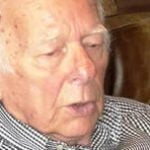 Bernard Sheridan
Bernard Sheridan
by James Morton
The solicitor Bernard Sheridan, represented clients from a wide cross-section of concerns – from the entertainment industry (Sir John Dankworth and Lou Reed) to human rights, including the case of the Chagos islanders exiled to Mauritius. If his profile was not as high as other media lawyers, it was because he was often happier obtaining a confidential, out-of-court settlement for his client than getting involved in a full-blown action. He looked after his clients, not just their legal problems.
Bernard was born on March 7 1927, into a north London Jewish family who kept a newsagent’s shop on the Blackstock Road, Finsbury Park. He attended Holloway County Grammar School for Boys. On leaving school he read law, on a scholarship, at the London School of Economics. His interest in the subject had been kindled during national service taking statements from soldiers seeking to petition for divorce.
For a short time after he qualified, he practised from the oddly named 82Z Portland Place. He originally intended to go into partnership but in 1956 founded his own firm, which, based in Red Lion Square, got a steady stream of work, much of it legally aided, from the local community. The work was stimulating, if frenetic: perhaps a divorce petition in the morning, a visit to Broadmoor in the afternoon and a conference on a human rights issue in the evening.
A main strand of his practice was the entertainment industry. In the early 1960s, when the wishes of the record company often held sway at the expense of the artists, Bernard was one of the first to challenge the standard agreement, improving royalty terms and ensuring that rights would eventually return to his clients, who included Pink Floyd, Matt Monro and Kate Bush, as well as songwriter Roger Greenaway.
In November 1968, he acted for the bandleader John Dankworth in his successful libel action against the News Chronicle, which had reported that he was prepared to play the Scala Ballroom, Wolverhampton, in defiance of a Musician’s Union ban that followed the exclusion by the venue’s management of non-whites.
The other main strand of his practice was in human rights, financed in part by the entertainment side. He was very much involved with the liberal barristers of the day, such as Sir Louis Blom-Cooper and Sir Dingle Foot, and was, for some years, secretary of War on Want. He was committed to the work of Toynbee Hall and Christian Aid. In 1968, he won damages for the charity over claims in a book that donations to the ANC were being used to buy hand grenades.
One of Bernard’s first major cases was in 1958, on behalf of Adbul Rahman al Baker of the Bahrain National party, who had been deported from Bahrain, then a British protectorate, to St Helena two years earlier after being convicted of conspiracy to murder the ruler of Bahrain and his British adviser. The judges had all been members of the ruling family. Ultimately, the British courts ruled that his deportation had been legal. He travelled from Cape Town to the island to see his client, and in 1961 al Baker’s detention was declared illegal by the privy council. Bernard was later invited to return to St Helena to defend in the only murder trial known to have taken place on the island.
For years Bernard fought on behalf of the Chagos islanders, who in 1971 were summarily removed to Mauritius, where many lived in abject circumstances, when the British government wished to hand Diego Garcia over to the Americans as a military base. He lived to hear of the government defeat in the judgment, delivered on May 23 2007, which ruled that the orders prohibiting the islanders from returning home were abuses of power and had been made without proper regard for their interests.
Bernard was also heavily involved in anti-apartheid campaigns and worked, often unavailingly, to save the lives of Africans sentenced to death in Rhodesia (now Zimbabwe). In 1965 he took the case of Richard Mapolisa, sentenced to death for his involvement in a petrol bombing which failed to ignite, to the judicial committee of the privy counsel. Although the death sentence was upheld, the sentence was commuted.
In 1967, Bernard acted for Kwesi Armah, a former Ghanaian high commissioner, in a libel action against the printers of Ghana Today after that government claimed Armah had bribed people to influence the home secretary to let him out of prison in England and refuse extradition. Armah had been accused of stealing £30,000 from the Ghanaian government; he was acquitted after a trial at the Old Bailey.
Tall and slim, Bernard was always impeccably turned out. A man with a great interest in all the arts, particularly English music and 20th century art, he was also a lifelong supporter of Tottenham Hotspur. By the late 1980s, the firm he created had expanded greatly, but as a consultant he continued to work seven days a week for a list of stellar clients, including the artist Damien Hirst.
Bernard died on May 26 2007 aged 80 years and is survived by his New-Zealand born wife Bethune, known as Bethin, whom he married in 1955, their three children and three grandchildren.
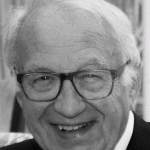
It is with great sadness that we have to record the recent death of John Simmonds in 2019, who would have been 80 on 8th March 2019, the day on which a thanksgiving service was held at St. Mary’s church, Standon, Herts. Among the large gathering present were George and Pam Ives, Peter Sumpter, Bob Pearson and Raymond Rowe, who gave one of the many moving tributes in John’s memory. There was a reading from John’s first book, ‘The Telephone On My Desk Rang… , where he recounts an episode that occurred in his working life in the 1970’s – a mystery that harks back to post war Europe. A copy will be placed in the school library for students to read and write their own exciting ending.
John Simmonds was born and lived in Belsize Park in London. He made a career in law as a solicitor specialising in insolvency and for the last 20 years of his working life, his post was as a High Court Bankruptcy Registrar. His hobbies included shooting, fishing, bird watching and playing bridge.
Following his retirement in 2011, aged 71, John moved to Hertfordshire where he had made many friends whilst enjoying his countryside pursuits. Art was another of his interests and he explored painting in a variety of mediums and styles.
During May Day celebrations in Standon he could be found selling his paintings for the upkeep of St Mary’s Church.
John became engaged in writing a book of fiction inspired by a moment of reminiscence of an intriguing occurrence. It happened in early the 1970s during his working life when his practice had acted for a clearing bank and he was asked to be an independent witness in the opening of a safe deposit box.
John’s dry humour, cool head and sound common-sense and advice will be much missed, not just by the club members, but by all those who knew him. Our sincere condolences go to his family at this sad time.
RR
Peter Sims BSc MSc FRGS FGS, who was at Holloway School from 1955 to 1963, died on Saturday 17th July 2021, aged 77. Peter had been diagnosed with pancreatic cancer in May this year and died peacefully in his sleep at home. He is sadly missed by his wife Wendy, his two daughters from his first marriage, and his two grandchildren, along with other family members, friends and colleagues. Peter was Associate Dean, at the Faculty of Social Science & Business (Learning & Teaching), at the University of Plymouth. Peter’s funeral took place on Monday 9th August in Tavistock.
Peter’s family has sent this tribute
Donations, if wished to be made, will be shared between St Luke’s Hospice Plymouth and the RNLI sent c/o Morris Bros, Lakeside, Tavistock. PL19 0AZ or via their website www.morrisbros.co.uk
Our thoughts are with his wife Wendy and his family
RR
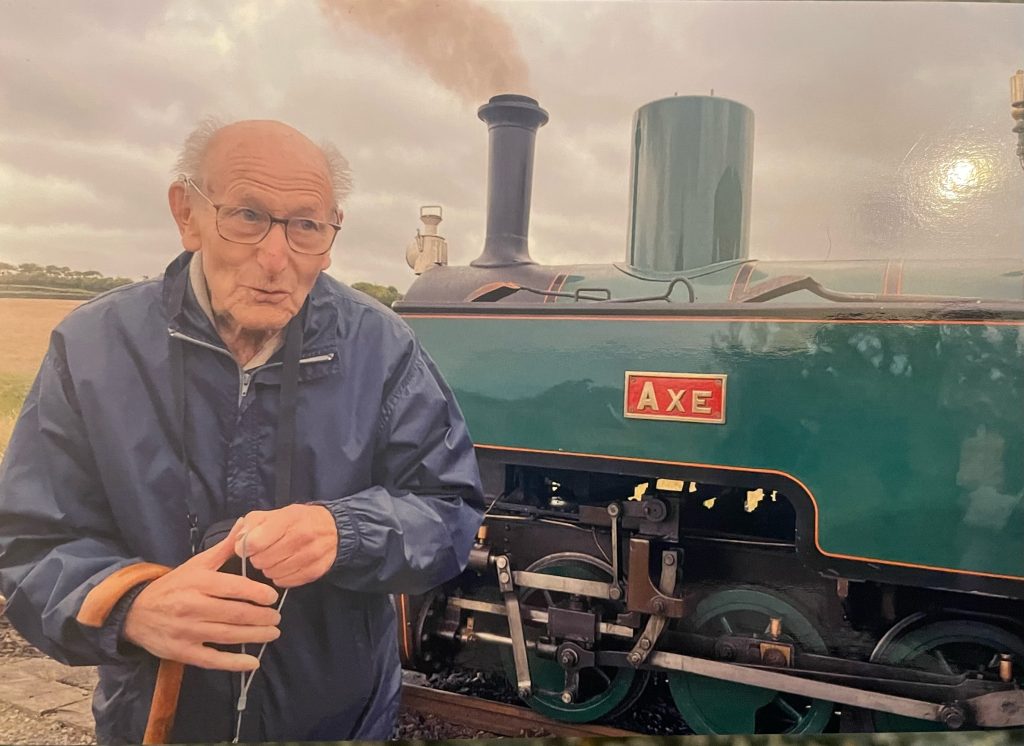
David loved steam engines and is pictured here with ‘AXE’, a Kerr, Stuart & Co. Ltd., No.2451, narrow gauge steam locomotive (Pauline Davies)
David William Smith, a former pupil at Holloway School from 1943 to 1950, died on 11th January 2024, aged 91. David was a stalwart supporter of the Old Camdenians and a for many years was a member of the George Ives 50+ Club , which generates funds that enables us to make bursaries and donations to the school and its pupils – thank you David!
David was born on 27th July 1932 and had an illustrious career, which I hope to reveal in a later update. Yes, sort of secret squirrel that the family were unaware of. David was evacuated like so many pupils during WWII. Sadly, his elder brother Leslie was killed in 1945 when his submarine went down. David lived life to the full and enjoyed all forms of steam transport. David was keen that everyone should have an opportunity of a good education and always fondly membered his time at Holloway School. He will be sadly missed.
I had the honour of attending David’s funeral on Thursday 15th February 2024, at 1.15pm, at Waltham Abbey Church, Highbridge Street, Waltham Abbey, Essex, EN9 1DG where his grandchildren:- Gavin; Alex; Imogen; Toby and Liam read a poem and told us how much of an influence David was in their lives. We then went to Enfield Crematorium, South Chapel, Great Cambridge Road, Enfield, EN1 4DS followed by a celebration of his life at ‘The Plough’, Sewardstone Road, EN9 3QQ. I had the pleasurer of meeting David’s family and friends and explaining his important role and support for the OCC.
Gavin had included our tribute and logo in David’s order of service booklet. It was placed opposite a collage of images of him. Please try the link ( you might need to rotate the image) David-Smith-OCC Logo
Our sincere condolences go to Pauline and Lesley (David’s daughters), his family and friends.
If you wish to make a donation in memory of David, the family have asked for donations to David’s favourite charity Woodgreen Pets Charity, Nos.298348 (formerly known as ‘Wood Green The Animals Charity’), which David supported and re-homed his cat. Ozzy, who is now looked after by Pauline.
Ray Rowe
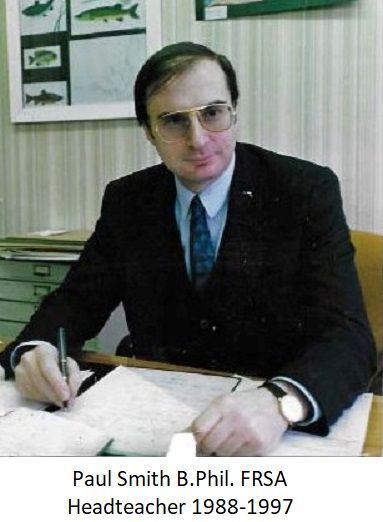
Paul Graham Smith, Headteacher at Holloway School from 1988 to 1997, died on 24th July 2021, aged 74. Paul always supported the Old Camdenians, both as President during his term of office and after he left. His funeral in Nuneaton was filmed and will be made available on the Old Camdenians website.
Born on 15th June 1947, Paul dedicated his life to education. He will be sadly missed by all.
Our condolences and best wishes go to Stephen Smith, Paul’s brother, and his family and friends.
The following tributes are from those who worked with him
Penelope Harris:
I remember the moment I was introduced to Paul. He had been appointed as Head of South Hackney lower school. He specialised in English and would therefore become a member of my English Department. I remember his eyes: direct warm quick and friendly. I knew we would get on really well.
Paul was the most dedicated and inspiring teacher I had ever met. The children in our school were a handful; full of energy and fun, mischievous and responsive. Many had difficulties at home but brimmed with energy and laughter.
It quickly became evident that Paul was an exceptional teacher. He encouraged motivated and inspired them with the confidence to do well. He was a brilliant teacher and he changed their lives for the better. He was gifted, caring, and committed to raising their horizons. I know that they could look forward to a future with a confidence that he had nurtured.
South Hackney became part of a four-school amalgamation. I spoke to Barry Simmons, the overall Head, who asked me to say this: “Paul was an inspirational teacher, a smashing bloke, he worked incredibly hard and he was wonderful to work with.”
In 1988 Paul was appointed as Headteacher of Holloway School. A few years after that I applied to be Paul’s Deputy and got the job.
My twin brother Philip had gone to Holloway school in 1958. I had ties. Philip had worked with Paul at South Hackney as head of resources and then at Kingsland as media resource officer (MRO). He had also worked with Paul training the football teams. Philip became the MRO at Holloway. With Paul’s wholehearted support he encouraged Philip to apply to the ILEA for a year’s secondment to develop multi-ethnic and disabled teacher support materials for use in all London schools. It was called “COPY ART”. It was sent to every school for teachers to use on worksheets to reflect the diversity of our children. It is incredible to think that up until that time only able-bodied and white children’s images had been used.
Philip told me he witnessed the way Paul looked out for children who needed help and understanding. He also supported his staff team. We were all lucky to have known him as a colleague and a friend for his passion, generosity, care, and great sense of humour.
I was privileged to know and work with Paul. And I was the most fortunate person in the world to have him as a friend.
Lidia Solari:
It is with sadness that I am writing this tribute but also with a degree of pleasure that I can express my gratitude and memories of Paul Smith – my “boss”.
I began working as an admin assistant at Holloway School in 1986 and Paul joined the school as Headteacher in 1988. I remember very well his first full staff meeting when he outlined his vision of where he wanted the school to go. He was clear about the goals set before him and how to go about achieving them. He was going to increase the intake of pupils and he wanted Holloway to become a more successful school. With great skill, intelligence and tenacity Paul managed to do this during his tenure.
During those nine years I was promoted to office manager and became Paul’s PA and I have many fond memories of us working together. It was a hectic and challenging time but also very rewarding and I can honestly say there was never a time I did not look forward to going to work as Paul always made me feel appreciated, which gave me a great sense of job satisfaction. Paul had respect and a great empathy for all the staff, from the cleaners upwards. Although quiet and unassuming in manner, Paul was extremely kind and generous, never wishing or expecting to be acknowledged or thanked. Many a good deed was done without due reward!
Since he left Holloway School in 1997 we kept in touch, and I shall miss our yearly catch-up at Christmas.
I was privileged to be able to attend his funeral recently and looked back fondly to a very special person.
Deirdre Murphy:
When Paul arrived at Holloway, Jo Hogan had retired and there were many changes that needed to take place. It was a time of much change in London schools as the ILEA was being disbanded and local authorities were taking control of Education.
I was Special Educational Needs Co-ordinator at the time of Paul’s arrival, and Paul displayed a real passion for the students who had many challenges. Children and students were at the heart of his work as a teacher and as headteacher and he wanted all children to have the best opportunities. We had a number of incredible successes at Holloway, and I do feel that Paul’s leadership and focus on students enabled success. He was determined, but at all times fair. He gave respect and expected respect on every level.
Holloway school faced many challenges, falling roll, reputation and funding, but Paul took all this on with vigour, determination and commitment. He worked incredibly hard and was very often the last to leave. He was a visible head, walking around the corridors from the old building to the new building throughout the day. He instilled calmness and dealt with difficult situations in a calm, measured way. He had a sense of humour and could always laugh with others and at himself.
I learnt a lot from Paul and in fact I am proud to say that he became a friend. We would chat a lot about education and about politics, sometimes over the odd glass of red wine.
Paul was tolerant and allowed staff to grow. He would never have used the phrase “grow your own” but that’s what he did. He looked at staff’s interests and gave them chances to explore and develop. I certainly benefited from this approach and went on to become deputy head and then headteacher. I believe very strongly that Paul’s belief in me put me on this path.
It is very important to recognise that Paul gave many students chances to turn themselves around and to look at themselves in a positive way, and I am certain that there are many students who could recall how Paul Smith emphasised the present and the future and not the past.
I was delighted to hear that when Paul left Holloway he got a headship in Coventry, at Lyng Hall, and was very successful in turning that school around before his retirement. After retirement he did some work for the Association of School and College Leaders in helping schools and heads.
I was very sad to hear about his illness and how hard it was for him in the last few years. I know he had a lot more to give to education and it is very sad that he died far too soon. He loved the work of the Old Camdenians. George Ives was the chair when Paul was head of the school and President of the Old Camdenians Club.
Dave Dennis:
In the early 90s Paul’s leadership saved the school from closure, and as a result of his success the school began to grow at a rapid rate. This period was a particularly challenging chapter in Holloway school’s history, and Paul’s leadership marked him out as an extraordinary headteacher.
They say leadership is about people, and management is about things. Although Paul was good with both, he clearly demonstrated he was a gifted people person. He was also a very capable, clever, caring, selfless and compassionate man with a brilliant sense of humour. The sort of leader that etches themselves into your heart and mind.
No challenge ever fazed him, and despite all the pressure and challenges of the role, he was always positive, friendly and approachable for both staff and the students. He worked hard, cared for his staff and was passionate about the students.
At the time Holloway was a challenging school, it was tough and required a lot of hard work, and Paul’s leadership won our commitment. I feel very fortunate to have worked under Paul’s watch, and I definitely benefited from his support. He gave a great deal to Holloway and his colleagues, and I am greatly saddened by the premature passing of this Holloway Hero.
Paul Freeman:
I do not believe the school that now stands on the site once occupied by Holloway Boys School would exist were it not for Paul Smith. Years after Paul dragged Holloway back from the brink of closure, and after he moved to his Coventry school, government realised that, actually, you could solve problems by throwing money at them. Paul was never given the resources he needed at Holloway, but what he did have was fierce determination and an indomitable will. Who now remembers that only about 30 students were signed up to join Holloway in the months before Paul took over? The school was whizzing towards its sell-by date. Paul’s first miracle was to earn the trust of sufficient Holloway parents through what he promised them. His second and more extraordinary miracle was to deliver on those promises, and, in short order, Holloway Boys became oversubscribed.
I was one of Paul Smith’s deputy heads from 1991 to 1997. On the occasions we drove into school at the same time, he would fly out of his car – some horrid blue thing he was immensely proud of – and head towards me like a ground-to-air missile. Having spent the evening, as usual, reflecting on what needed doing, he launched into his two lists: that which had to be done immediately and that which had to be done right now. I tried to keep up, to make notes, very often distracted by the question of whether I should mention the candy floss of shaving foam drying on the side of his head. These briefings could be lengthy, and often as he spun away from me he would, slightly sheepishly, and a tad belatedly, wish me a “Oh, good morning by the way”.
Not that Paul was a rude man. In fact he was exquisitely courteous and thoughtful. To celebrate my first birthday at the school he struck me dumb by bringing in a cake. Now I shall not have the opportunity to tell him how much that act meant to me. Paul thought that Wordsworth had it right, The best portion of a good man’s life is his little, nameless, unremembered acts of kindness and of love.
There was a brief spell soon after the end of Paul’s tenure at Holloway, when a craze emerged at the Department for Education for Superheads. These characters were anointed, appointed and generously salaried, before being fired, sometimes within months; rare confirmed cases of spontaneous human combustion. Paul Smith, an essentially shy and retiring man, engineered himself into someone who could cause hundreds of unruly boys to fall dead silent merely by tilting his head and taking one sideways step. He did remarkable things. In our darkest moments he would dissolve us into helpless laughter. Of the uniformed critics he would say,“We shall make our own judgments.” The Paul Smith I knew was the real thing, a genuine Superhead and a deeply kind man.
